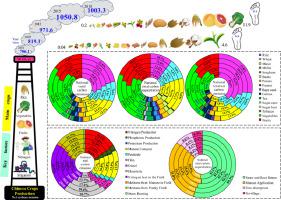Resources, Conservation and Recycling ( IF 11.2 ) Pub Date : 2021-05-21 , DOI: 10.1016/j.resconrec.2021.105661 Xiaohui Chen , Changcheng Ma , Huimei Zhou , You Liu , Xiaoman Huang , Mingkuang Wang , Yuanyang Cai , Da Su , Muhammad Atif Muneer , Mengchu Guo , Xuanji Chen , Yuan Zhou , Yong Hou , Wenfeng Cong , Jiuxin Guo , Wenqi Ma , Weifeng Zhang , Zhenling Cui , Liangquan Wu , Shungui Zhou , Fusuo Zhang

|
Agriculture affects climate change and contributes directly and indirectly to greenhouse gas (GHG) emissions. However, no reports have fully quantified the GHG emissions from different crop systems in China. In this study, the carbon emission and carbon sequestration inventories and the carbon footprint (CF) of 16 major crop systems in China from 2001 to 2018 were analyzed with a cradle-to-farm gate life cycle analysis approach for the first time. The results showed that the largest farm CF and product CF were vegetables (11.9 t CO2 eq ha−1) and tea (4.6 t CO2 eq t−1), respectively. From the perspective of crop emissions and processes, the main crop systems influencing the national total net carbon emissions (NTCE) from crop production are rice, maize, wheat, fruits and vegetables, accounting for 87.3–90.4%; the key emission processes for NTCE are fertilization and irrigation, accounting for 73.7–76.8%. The NTCE has increased by 410.4 Mt CO2 eq from 2001 to 2018, of which maize, fruits and vegetables were the main crops that explained 99.0%, while fertilization and irrigation were the key factors and explained 91.9% of these increases. Scenario analysis indicated that increasing the straw return rate and partially replacing chemical fertilizers with manure have a minimal impact on NTCE. In contrast, reducing the loss of reactive nitrogen is the most effective single strategy to alleviate agricultural GHG emissions in the future. Our results will provide a fresh perspective for the development of more effective GHG emission reduction strategies for agricultural green development.











































 京公网安备 11010802027423号
京公网安备 11010802027423号